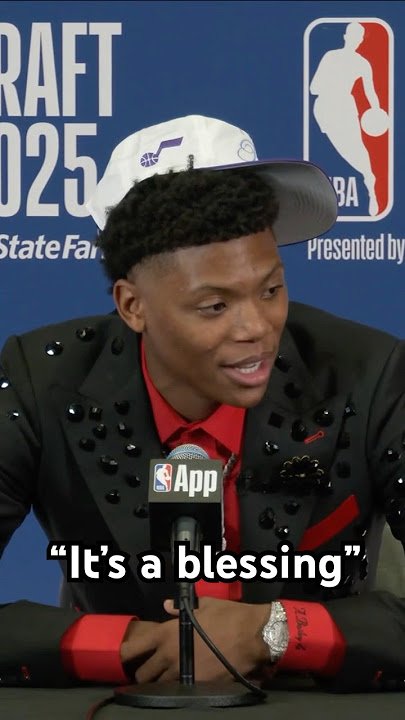Ace Bailey’s Uncertain Start with the Utah Jazz: A Delayed Arrival and Minimal Contact
The Utah Jazz’s latest draft pick, Ace Bailey, has found his arrival in Utah delayed, leaving both fans and the team with questions surrounding his integration into the roster. Originally expected to join the team shortly after the NBA draft, Bailey will not arrive in Utah until three days after being selected. This delay comes on the heels of a period where Bailey has had minimal contact with the Jazz organization, raising eyebrows about how smoothly the transition into his new team will be.
A Late Arrival After the Draft
Ace Bailey, a highly regarded prospect with immense potential, was drafted with high expectations for the upcoming season. However, the news that he will not arrive in Utah for three days after his draft announcement has left fans concerned. It is not unusual for top picks to have a bit of time before officially joining the team due to logistical reasons, personal arrangements, or post-draft obligations. But this late arrival adds an element of uncertainty to his debut with the Jazz.
Though three days may not seem like a substantial delay in the grand scheme of things, the timing is critical. Rookies typically undergo an intense series of introductory workouts, media events, and team-building activities shortly after being drafted. Missing out on these early experiences could place Bailey at a disadvantage compared to other rookies who were able to immediately immerse themselves in the team’s culture.
Minimal Contact with the Jazz Organization
Adding to the mystery surrounding Bailey’s debut is the revelation that his interaction with the Jazz has been minimal since being drafted. While other teams may have ramped up communication with their incoming rookies, helping them settle in or providing mentorship, Bailey’s experience appears to be quite different. It’s unclear whether this is due to the team’s strategy or external factors, but it does raise questions about how well-prepared he will be when he does finally arrive.
Minimal contact could be a result of several things. One possibility is that the Jazz may have been prioritizing other offseason tasks, such as player development or roster adjustments, and may not have had the time to make Bailey feel as integrated as other rookies. Another potential reason could be Bailey’s own circumstances, perhaps relating to his post-draft obligations or personal matters. However, such minimal interaction with the organization is certainly not ideal for a rookie trying to make a positive impression in a new environment.
Potential Impact on His Transition
The delayed arrival and limited interaction with the Jazz could affect Bailey’s early development in a number of ways. First and foremost, the lack of face-to-face time with coaches and teammates might delay his ability to understand the team’s playbook, offensive schemes, and defensive assignments. This slow start could put him behind the curve when it comes to preparation for training camp and preseason games.
Another concern is the chemistry between Bailey and his new teammates. The Jazz, like any team, rely on developing strong bonds and communication both on and off the court. As a rookie, Bailey is expected to integrate quickly into that system, but with his late arrival, he may find himself playing catch-up during a critical time in the offseason.
In addition to the team’s dynamics, Bailey’s individual training could suffer. Rookies are typically expected to put in significant work with team trainers and strength coaches, but if he arrives late, his conditioning might be impacted. If Bailey’s conditioning isn’t up to the standards set by the team, he may struggle to match the intensity and pace expected of him during the regular season.
The Silver Lining: A Strong Work Ethic
While the delayed arrival and minimal contact with the Jazz are concerning, there is still reason to believe that Bailey will overcome these early setbacks. Known for his strong work ethic and focus on improvement, Bailey has the tools to make up for lost time. His talent and determination could ultimately shine through as he catches up with his new team.
In addition, the Jazz’s coaching staff is experienced and knows how to handle rookies, especially one with the potential that Bailey possesses. If the team provides the necessary support once he arrives, Bailey could still make a smooth transition into the NBA and have a solid rookie campaign. The early challenges may serve as an opportunity for Bailey to prove his resilience and adaptability, two traits that are crucial for success in professional basketball.
Conclusion
Ace Bailey’s delayed arrival in Utah and minimal contact with the Jazz present some early obstacles, but they are not insurmountable. While the delay raises questions about his preparation for the upcoming season, Bailey’s proven work ethic and the Jazz’s robust support system may help him catch up quickly once he finally joins the team. In the end, this early uncertainty may turn into an opportunity for Bailey to prove himself in an even greater capacity, showing that he can rise above the challenges and make a significant impact on his new team.
